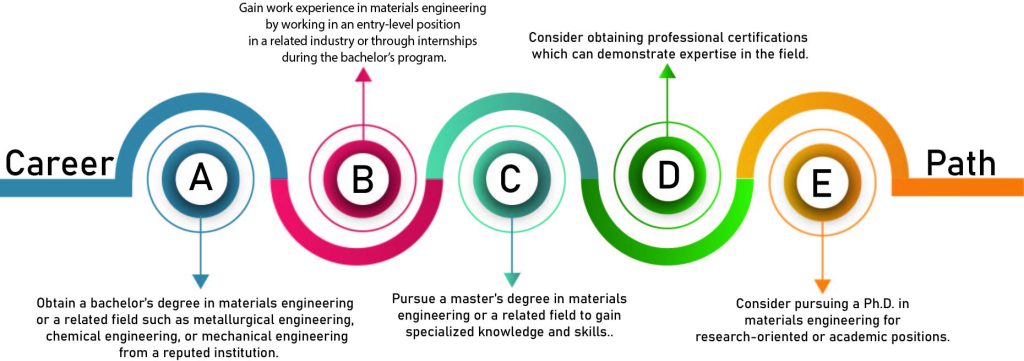Materials engineering is a branch of engineering that involves the study of the properties, structure, design, and processing of materials. This field seeks to develop and improve materials for use in a wide range of applications, including construction, electronics, medicine, transportation, and energy. Materials engineers work to understand the physical and chemical properties of materials and how they can be manipulated to enhance their performance and durability. They also explore new materials and techniques for manufacturing and processing them to meet specific needs and requirements.

Work description
The work of a materials engineer typically involves researching, designing, developing, and testing materials for use in various applications.
They use their knowledge of the properties and behavior of materials to determine how they can be modified or manipulated to improve their performance or durability.
They also work to identify new materials and techniques for manufacturing them. Materials engineers may collaborate with other engineers and scientists to develop products or systems that incorporate materials, and they may also be responsible for overseeing the manufacturing and production processes to ensure quality and consistency.
Additionally, they may analyze and troubleshoot problems that arise with materials in use and work to find solutions to these issues.
Growing demand
Materials engineering is a rapidly growing field with increasing demand for materials scientists and engineers.
Diverse applications
Materials engineering has a wide range of applications in various industries such as electronics, aerospace, energy, healthcare, and more.
Innovation
Materials engineering is a constantly evolving field that requires creativity and innovation to develop new and improved materials.
Challenging and interesting work
Materials engineers face complex challenges and problems that require critical thinking and problem-solving skills.
High earning potential
Materials engineers can earn a competitive salary with the potential for career advancement.
Contribution to society
Materials engineers play a vital role in creating materials that improve the quality of life for people around the world.
Requires extensive education
Materials engineering typically requires a high level of education, including a bachelor’s degree and often a master’s or doctoral degree.
Requires specialized knowledge
Materials engineering is a highly specialized field that requires specific knowledge and skills in materials science and engineering.
High level of competition
The field of materials engineering is highly competitive, and securing a job can be challenging, especially in certain geographical areas or industries.
High-pressure work environment
Materials engineers may face tight deadlines and high-pressure situations when working on complex projects, which can be stressful.
Can be physically demanding
Materials engineering can involve working with heavy machinery and equipment or spending long hours in a laboratory or manufacturing environment, which can be physically demanding.
Limited job growth in certain industries health issues
While materials engineering is a growing field overall, some industries may have limited job growth opportunities due to technological advancements or shifts in demand.
The cost of pursuing a career in materials engineering in India can vary depending on the type of program, the institute you choose, and other factors such as living expenses.
Typically, a bachelor’s degree in materials engineering from a reputable institute can cost anywhere between 4-10 lakhs per year.
Pursuing a master’s degree in materials engineering can cost around 2-5 lakhs per year.
Additionally, students may also incur additional expenses such as accommodation, food, and transportation, which can add up to a considerable amount. Scholarships and financial aid may be available to help offset some of these costs.
[wpcharts type=”horizontalbarchart” bgcolor=”red:gray:yellow,blue:gray:yellow,random:gray:yellow,purple:gray:yellow” min=”0″ legend=”true” titles=”2 year , 5 year” values=”3,7,5,12″]
The earning potential of a materials engineer in India can vary depending on factors such as experience, education, location, and industry.
On average, a materials engineer with a bachelor’s degree can earn a starting salary of around INR 3-5 lakhs per annum in India. With a master’s degree and some experience, the salary can increase to around INR 6-10 lakhs per annum.
Materials engineers with several years of experience and specialized skills can earn significantly higher salaries, ranging from INR 15-30 lakhs per annum or even more in some cases.
Materials engineers working in industries such as aerospace, defense, and electronics may earn higher salaries compared to those working in other industries.
Additionally, materials engineers who pursue higher education, such as a Ph.D., or who move into management positions may also have higher earning potential.
[wpcharts type=”horizontalbarchart” bgcolor=”red:gray:yellow,blue:gray:yellow,random:gray:yellow,purple:gray:yellow” min=”0″ legend=”false” titles=”Entry-Level, Mid-Career, Senior-Level ” values=”5,15,25,35,45,55″]
Strong foundation in science and mathematics.
Good analytical and problem-solving skills.
Curiosity and a desire to learn and innovate.
Attention to detail and precision in work.a
Strong communication and interpersonal skills.
Ability to work well in a team and collaborate with others.
Adaptability and flexibility to changing work requirements and environments.
Weakness in science and mathematics.
Poor time management and organizational skills.
Lack of attention to detail and precision in work.
Limited creativity or innovative thinking.
Poor communication or interpersonal skills.
Resistance to working in a team or collaborating with others.
Difficulty adapting to changing work requirements and environments.a
Work-life balance
The work-life balance of a materials engineer can vary depending on factors such as industry, employer, and job role. However, in general, materials engineers may have a good work-life balance compared to some other engineering fields. Some reasons for this include:
Limited need for fieldwork: Materials engineering work is often conducted in laboratories, research facilities, or manufacturing plants, rather than in the field. This can reduce the need for frequent travel or long hours away from home.
Regular work hours: Materials engineers often work regular office hours, with limited need for overtime or weekend work.
Opportunities for remote work: Some materials engineering jobs may allow for remote work or flexible schedules, which can improve work-life balance.
Emphasis on research and development: Materials engineering work often involves research and development, which can allow for more control over work schedules and deadlines.

Advancing technology and innovation by developing new materials and improving existing ones.
Solving real-world problems such as designing more efficient and sustainable products, creating stronger and lighter materials, and developing materials for medical applications.
Contributing to industries such as aerospace, automotive, construction, energy, and electronics.
Collaborating with scientists, engineers, and researchers from different fields to develop interdisciplinary solutions.
Improving manufacturing processes by optimizing material properties and reducing waste.
Creating job opportunities in various industries and promoting economic growth.
Biomaterials
Developing materials for medical implants, drug delivery, and tissue engineering.
Ceramics
Designing and producing ceramic materials for applications in electronics, construction, and energy production.
Composites
Developing materials with enhanced properties by combining two or more different materials.
Electronic materials
Designing and producing materials for electronic devices such as semiconductors, solar cells, and LEDs.
Metals
Developing and improving metallic materials for applications in manufacturing, aerospace, and construction.
Conclusion:
In conclusion, a career in Materials Engineering offers exciting opportunities for innovation, problem-solving, and contributing to society. With a broad range of specializations, materials engineers have the potential to make a significant impact on various industries, from healthcare to aerospace. Materials engineering is a promising field for those who are passionate about science, technology, and creativity.



